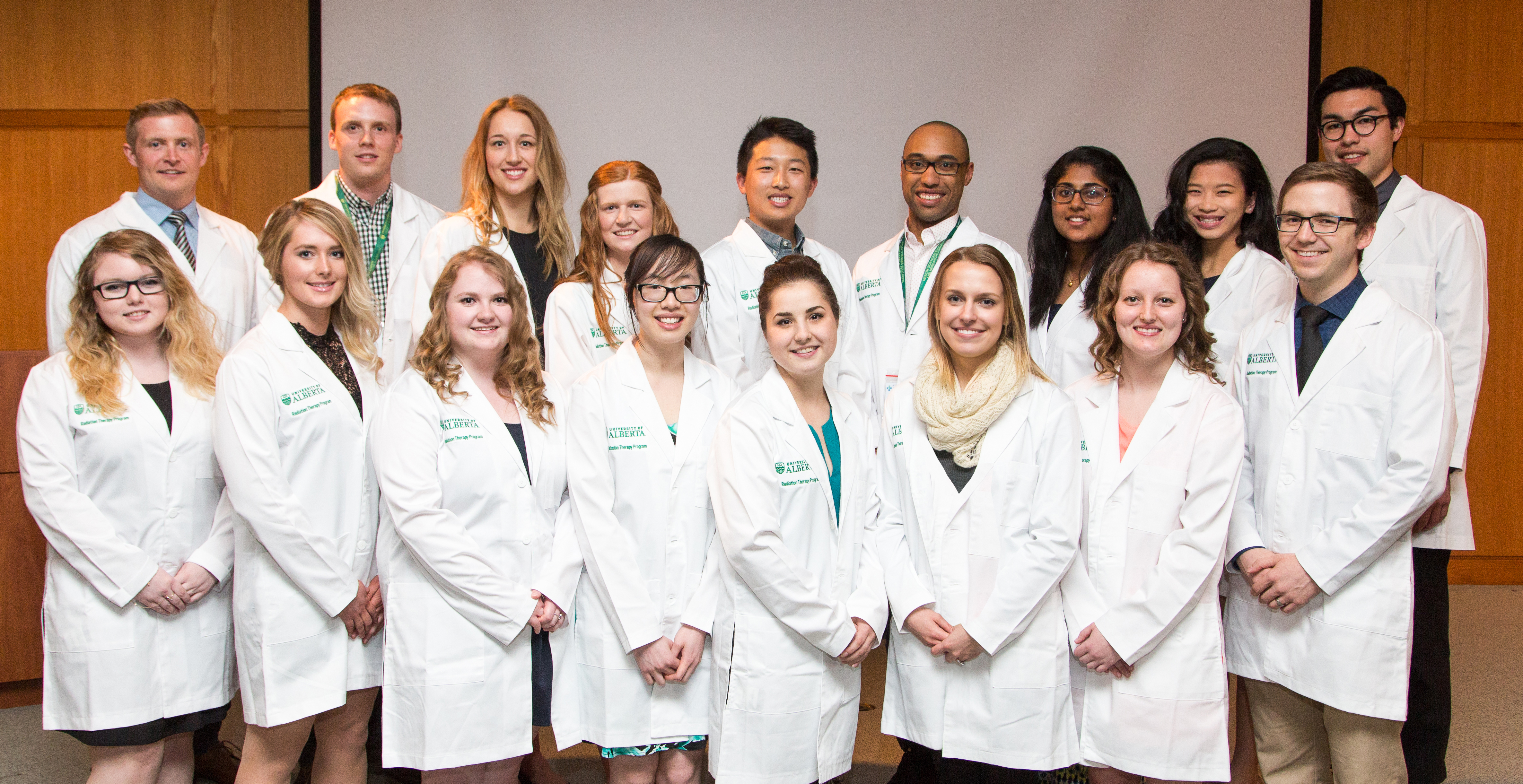
Radiation Therapy students at their Clinical Transition Ceremony.
New tradition marks clinical transition for radiation therapy students
The auditorium was filled with beaming faces. As students crossed the stage and received their white coats, the pride from the friends, family, and academic and clinical staff in the audience was almost tangible. While ceremonies like this are common in health sciences programs, this event was unique.
On May 20, The Faculty of Medicine & Dentistry's Department of Oncology celebrated its first Clinical Transition Ceremony for students of the Radiation Therapy Degree Program. The inaugural ceremony marks the transition from classroom learning to clinical practice. The students will leave the classroom, enter a clinical environment as student health care professionals and begin interacting with patients.
The Bachelor of Science in Radiation Therapy degree first began accepting learners in September 2014. The first graduates will complete the program in spring 2017.
Radiation therapy is used alone or in conjunction with surgery and chemotherapy to treat cancer. A radiation therapist is a key team member in the treatment of patients with cancer. The therapist is responsible for: assessing and educating patients; planning, calculating and delivering therapeutic doses of ionizing radiation; and verifying radiation treatment accuracy with a variety of imaging methods.
Radiation therapy student Chad Freeman notes that the biggest challenge when moving from the classroom to a clinical environment is the quick thinking that's involved.
"You use all the information you learn in the classroom, but rather than repeating what you learned on a test, you have to translate that to real-life practice," says Freeman.
Freeman is a member of the 2017 class and already had his first clinical experiences. One of the most striking things he noticed when he began clinical placements was that the role of radiation therapist is so much more than the treatment itself.
"We see the patients every day, it's important for us to be able to assess and help direct them down the right path to get the care they need, whether that's psychosocial resources or side effect management," says Freeman. "We develop important relationships with our patients."
Freeman's first clinical experience was the highlight of his education thus far.
"I haven't had much cancer in my life, so I hadn't really seen a patient's journey," he says. "When we did our first clinical we had the experience of shadowing radiation oncologists, nurses, social workers and all of the different multidisciplinary partners, and it gave me a really well-rounded picture of patients care."
Program director Susan Fawcett echoes the importance of clinical experience for the students.
"We are trying to develop a culture of caring and that really starts the day they walk into the program," explains Fawcett. "The first year is all academic work, so it's sometimes difficult to develop a sense of what the patient experience is like until you're participating in it."
She believes the significance of the ceremony is to mark the importance of that transition.
"When the students first step into the clinical environment they have a sense of accomplishment and awe, but at the same time they're a bit overwhelmed, because this is where the rubber meets the road and everything they've learned about communication, assessment, empathy and being able to manipulate million-dollar equipment comes to fruition," she says.
Fawcett hopes to create a tradition for the new program that would mark the importance of this professional transition and foster a sense of community and connection among future alumni.
Most importantly, Fawcett is proud of how far the learners have come. "I'm extremely proud of these students," says Fawcett. "They're a really great bunch, it's been a privilege to watch them learn, mature, grow and support each other."
All paths lead to Edmonton
Last week's convocation highlighted many great stories, including some unexpected delights. The stories of Tony Fields and Vineet Rathood show that the no matter where you start, you can achieve greatness at UAlberta.
Tony Fields was born and raised Barbados; he had never considered the prospect of living in Canada until he met his wife, an Albertan. On June 10, almost exactly 42 years after receiving his medical degree at the University of Alberta, Fields returned to the same stage to receive an honorary doctor of science degree in recognition of his distinguished contributions to cancer care in Alberta. Fields is recognized as a champion for improved patient care and outcomes, and his contributions to cancer care in the province are immeasurable.
Read Fields' full convocation addresshere.
Biochemistry graduate Vinteet Rathood wasn't sure what he was getting into when he moved from Tanzania to Edmonton to pursue his education. He wasn't even sure what to pack to get through Edmonton's infamously cold winters. Luckily, a born adventurer, Rathood settled into campus life and made the most of his education by getting involved in opportunities both in and out of the classroom.
Read Rathood's full storyhere.